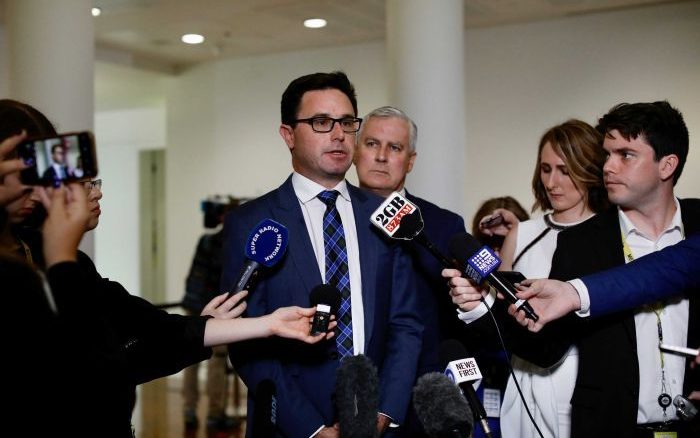
TUESDAY, FEBRUARY 4
Nationals leader and Deputy Prime Minister Michael McCormack has survived a challenge for his job from his predecessor, Barnaby Joyce, but it is being speculated that the vote was not the end of the matter.
The result of the ballot has not been released with sources within the party suggesting it was very close, setting up the possibility of another challenge by Mr Joyce in the not too distant future.
In other Nationals changes to come from the leadership spill:
- David Littleproud defeated Keith Pitt and David Gillespie to become deputy leader of the Nationals, and
- Joyce backer and Resources Minister Matt Canavan will lose his ministry and seat in Cabinet.
The Nationals votes came as Adam Bandt was elected unopposed as leader of the Greens to replace Richard De Natale who has resigned. Larissa Waters and Nick McKim will serve as his deputies.
Mr Joyce called for a challenge to Mr McCormack’s tenure as Nationals leader yesterday.
Jostling for the leadership began when Bridget McKenzie resigned as deputy leader on Sunday, amid the sports grants saga.
“I look forward to working and continuing to work with Barnaby Joyce, who put his hand up for the leadership,” Mr McCormack said when he emerged from the party room meeting today.
“I also continue to look forward to working with Keith Pitt and David Gillespie, who put their hands up for the deputy leader’s role.”
Mr McCormack has led the Nationals since Mr Joyce lost the job surrounded by scandals two years ago.
Mr McCormack has faced internal criticism about his leadership and had to contend with backbench destabilisation since assuming the role.
“I commend David Littleproud as the newly elected deputy leader for the role he played this very worrying and troubling summer in drought, in bushfires and everything else that has beset regional Australia,” Mr McCormack said.
“We will continue as a united team, to put the people of regional Australia first and foremost.”
###
The first plane-load of Australians evacuated from the coronavirus epicentre of Wuhan has arrived on Christmas Island, after first travelling to specially quarantined facilities at a remote airbase in Western Australia.
The Qantas 747, the first Australian evacuation flight out of Wuhan since the epidemic began, touched down at RAAF Base Learmonth near Exmouth, about 1,200 kilometres north of Perth, just after 4:00pm on Monday.
It was carrying 243 passengers, 14 crew, four pilots and officials from the Department of Health.
Several children were on board, with 89 evacuees under 16 years of age, including five under the age of two.
The 747 could not land at the small Christmas Island airstrip, so officials had planned to transfer the passengers to two smaller planes to make the trip to the island, about 2,000 kilometres north-west of the WA coast.
A chartered flight left the Learmonth base at about 8:00pm Monday, bound for Christmas Island and it landed at 9:01pm (local time).
A Royal Flying Doctor Service (RFDS) flight also left Learmonth.
A spokeswoman for the WA Department of Health said a patient had been transported to Perth but that decision was not related to the coronavirus.
The patient had a condition that made it necessary for them to be close to a tertiary hospital, the spokeswoman said, and they would be kept in home isolation following the appropriate protocols.
WA chief health officer Andrew Robertson earlier said it was unlikely any passengers would have developed an illness or coronavirus symptoms during their flight from Wuhan.
The flight out of Wuhan was the first of two that will take several hundred Australian citizens and permanent residents out of the locked-down city.
They will spend two weeks in quarantine at the almost-empty immigration detention centre on Christmas Island with a team of doctors and nurses.
###
The Federal Government has stepped in to help Queensland take measures to protect people from shark attacks in the Great Barrier Reef Marine Park.
It involves $5 million Federal funding towards non-lethal shark protection measures after the Queensland government lost a court decision last year and removed drum lines in the Park.
The state government has resisted installing non-lethal shark measures after losing the right to use baited hooks to catch and shoot dead 19 shark species in the world’s largest coral reef.
But of the funding announced on Tuesday, $4 million will go towards non-lethal measures including so-called SMART drumlines, which alert authorities when sharks have taken bait on a hook so the animal can be removed and released elsewhere.
The funding will also go towards rebating councils to install swimmer safety netting, drone surveillance and swimmer education.
It is expected the equipment will be installed within weeks.
Queensland Fisheries Minister Mark Furner says the Great Barrier Reef Marine Park Authority amended a permit which took into account workplace health and safety issues.
Mr Furner has previously said handling live sharks and releasing them from drumlines was dangerous for state government workers.
He also released a study which indicated SMART drumlines, or Shark-Management-Alert-In-Real Time drumlines, would not work along the Great Barrier Reef.
SheSociety is a site for the women of Australia to share our stories, our experiences, shared learnings and opportunities to connect.

Leave a Reply